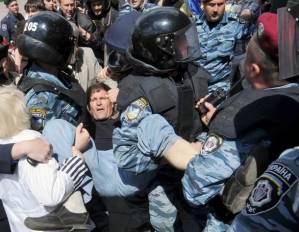Fifth criminal investigation over language law protest
 s
s
Protests on 5 June (Photo: Reuter)
The Kyiv Prosecutor’s Office has announced that a fifth criminal investigation has been initiated over the protests outside parliament after the first reading of the controversial Kivalov-Kolesnichenko language law on 5 June. As reported, the same draft bill was, in breach of regulations, presented for voting on 3 July and supposedly passed.
This criminal investigation is under Article 345 § 2 of the Criminal Code – threats or violence against law enforcement officers. The Prosecutor’s Office states that it follows complaints from Interior Ministry Internal Forces officers that they received injuries while carrying out their “duties to ensure public order during the protest action”.
The report states that protesters ripped the helmets from the officers, damaged their uniform, took away their special equipment and inflicted bodily injuries.
The Prosecutor’s Office has already initiated 4 criminal investigations over the events on 4 July outside Ukrainsky Dim [Ukraine House], over what it calls, resisting police officers carrying out their duties and inflicting bodily injuries.
Given the ongoing nature of the protest outside Ukrainsky Dim and other parts of the country, the announcement of yet another criminal investigation, especially a month after the events, is of concern.
The protest on Tuesday, 5 June in the centre of Kyiv involved thousands of protesters and huge numbers of Berkut riot police. The UNIAN news agency reported that tear gas appeared to have been used both by riot police and by protesters.
This followed the first vote in parliament on the highly contentious bill “On the Principles of State Language Policy”. The bill had been, and is still widely condemned by public figures, religious organizations, civic organizations as well as opposition politicians as being the first step to making Russian the second official language and dividing the country and its people.





